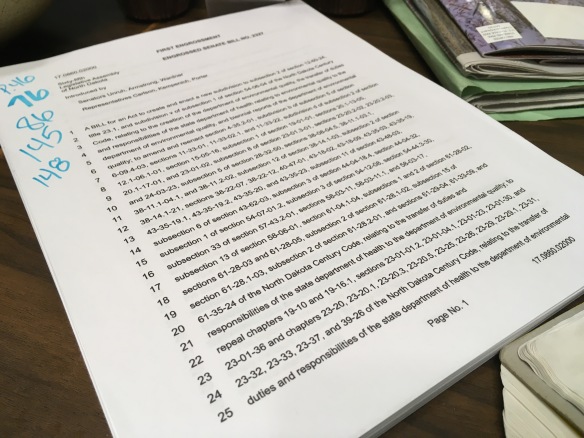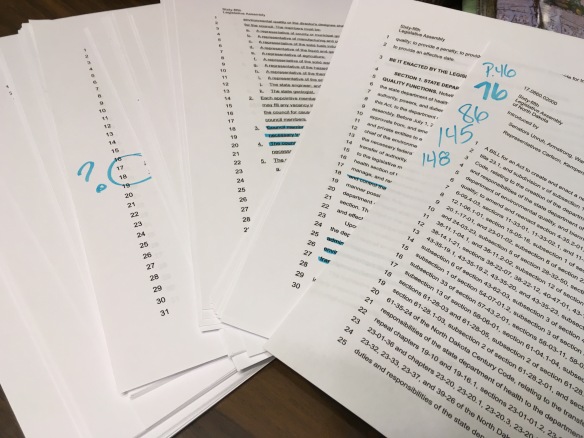Warning…political post ahead. But it’s worth a read, especially if you live in North Dakota.
I recently became aware of a bill that’s being pushed through the North Dakota legislature. And I’m not sure if the word “pushed” even gets close to describing how quickly it’s being hurried along. In fact, it only spent 90 minutes in committee on the Senate side before getting a “Do-Pass” recommendation. Not bad for a bill that’s 153 pages in length. (And yes, I’ve read the whole thing.)
Let me break down a few of my concerns:
- This bill creates, in essence, a state Environmental Protection Agency. I’m not sure yet if I’m for or against the creation of a state EPA, but I do know that it should take some time and thought in order to make sure it’s done right. Not just cut and paste certain sections of the existing century code and call it a day.
- This bill creates a new division of government. Yes, it’s true that there is already an existing Division of Environmental Health that exists under the Department of Health. This would take that department and make it its own division. Is there something wrong with the current system? Is there a benefit for the new division that we aren’t being made aware of? Grant dollars? Federal money? What’s the carrot for more government when a division already exists? I understand the desire to streamline. But when the department seems to be just a cut-and-paste model of what’s already in place…I don’t understand the point.
- “Zero fiscal impact.” Come again? You’re going to create a new division of government…with no money? Yes, I know that the bill provides that “any special funds or accounts administered or under the control of the state department of health which relate to environmental quality functions transferred to the department of environmental quality must be transferred to the administration and control of the department of environmental quality.” (Engrossed Senate Bill No. 2327, lines 24-27, pg. 2) Which is a messy way of saying that any money appropriated for environmental stuff now moved into the new department will also be transferred to the department. But can you really start a new division of government with NO added expenses? Even if you just shuffle around existing employees – aren’t there extra costs? What about letterheads? Business cards? Office space? Compensation for council members? Not one more dime will be spent? I’m almost interested in seeing this pass, just to watch this happen. (Not really…that’s sarcasm.)
- Speaking of council. There’s a new one in town. The “Environmental review advisory council,” will be established, consisting of 11 members. All appointed by the governor. The members must be: a representative of county or municipal government; a representative of manufacturing and processing; a representative of the solid fuels industry; a representative of the liquid and gas fuels industry; a representative of agriculture; a representative of the solid waste industry; a representative of the hazardous waste industry; a representative of the thermal electric generators industry; a representative of the environmental sciences; the state engineer; and the state geologist. Energy is well-represented – and agriculture gets one seat at the table. Seems a little lopsided to me, for an agency that will dictate what a lot of agriculture will look like in the future.
- Did I mention the head of this new division will also be appointed by the governor? The director, as well as the council as a whole, will be appointed to serve “at the pleasure of the governor.” Environmental quality and the people will have no say in who will serve, except by vote of the governor. I’m sorry, but as our elected officials become more and more removed from agriculture, I am not comfortable relying on one person’s ability to know what is best for the diverse world of agriculture we are in. Can one person adequately represent the ranchers of Dickinson, the valley sugar beet farmers, organic growers, niche markets, wheat growers, hog farmers, dairy farms and everything in between? We can’t agree amongst ourselves most days – how would one person be able to encompass it all?
I could go on for longer, but you can read it all yourself if you’d like.
I’m all for streamlining systems and making government more efficient whenever we can…I just am not sure creating a new division will accomplish this. I’ve never seen a situation in which adding more government makes it easier to maneuver and understand. But maybe this would be a first.
I’ve spent no less than seven hours studying, discussing and considering this bill. I printed 153 pages of text, made several calls and emails, and delayed my calving checks a few times because I was in a zone with reading and research. (Don’t tell Mark.) In all, I’ve already spent significantly more time than the committee did before issuing a DO PASS. And my monetary investment with printing costs and time spent is somehow more than the fiscal impact that this bill will have on my state.
Excuse me while I go check cows…at least out there I’m well aware of the dung I may step in. I hope I’ve given you a few things to think about. And if you’re just as concerned as I am, there will be a committee hearing for the House at 9 a.m. on Friday, March 3. Maybe your voice should be heard.


